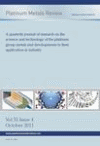-
oa Tailored Palladium/Silica Spheres
- Source: Platinum Metals Review, Volume 45, Issue 4, Oct 2001, p. 174 - 174
-
- 01 Jan 2001
Preview this article:






Tailored Palladium/Silica Spheres, Page 1 of 1
< Previous page Next page > /docserver/preview/fulltext/pmr/45/4/pmr0045-0174b-1.gif
There is no abstract available.
© Johnson Matthey


